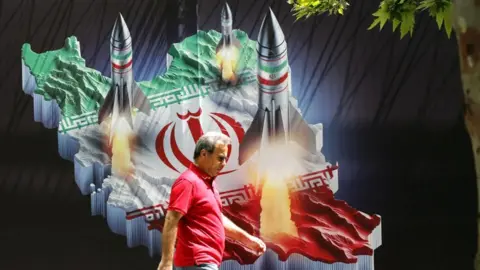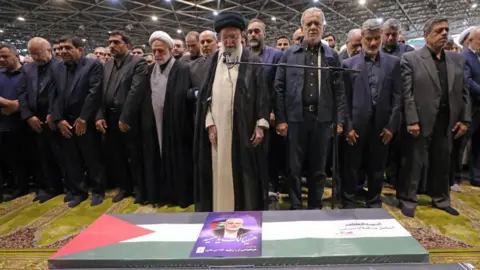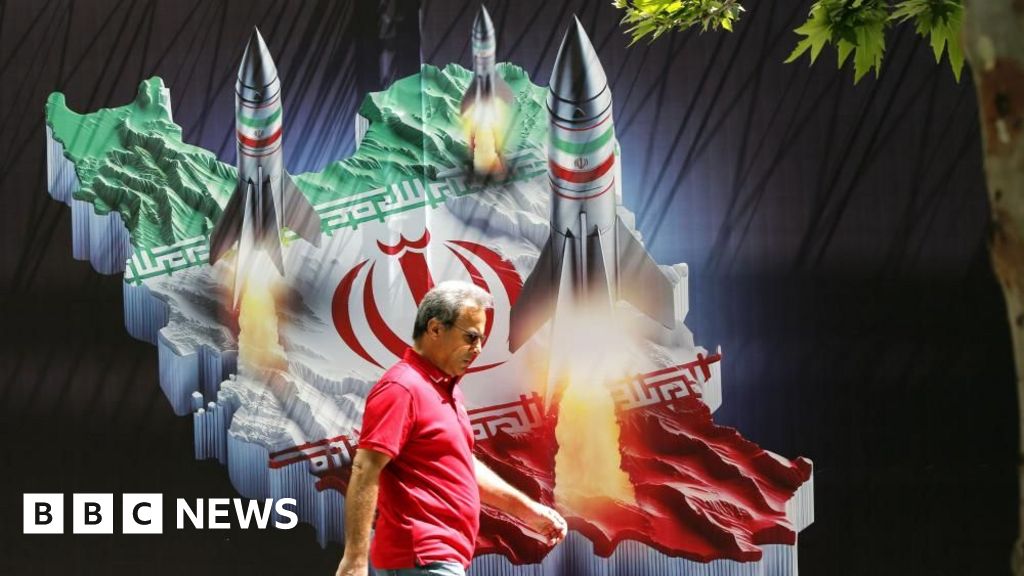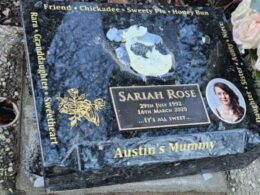Iran keeps region guessing as it mulls revenge attack
 EPA
EPAIn the Saudi city of Jeddah on Wednesday, the Organization of Islamic Cooperation (OIC), a group of 57 countries, held an emergency meeting at Iran’s request to discuss, among other things, the assassination of the Hamas political leader Ismail Haniyeh in Tehran last week.
The gathering was an opportunity for Iran, whose Supreme Leader Ayatollah Khamenei has vowed “harsh punishment” for the killing, to lay out the reasons for an expected retaliation.
Both Iran and Hamas say the 31 July assassination was carried out by Israel, which has not commented but is widely believed to have been behind it.
Baqeri Ali Bagheri Kani, the acting Iranian foreign minister, said his country had “no choice” but to respond, and that this would take place “at the right time and in the appropriate shape”.
Mr Kani also described the possible Iranian reaction as “not only a defence of its own sovereignty and national security” but also a “defence of the stability and security of the entire region”.
Haniyeh was killed in a heavily protected guesthouse run by the Islamic Revolutionary Guard Corps (IRGC), Iran’s elite military force, as he visited Tehran for the inauguration of the country’s new President Masoud Pezeshkian, a humiliating breach of Iranian security.
Since then, every sign, speech, or statement from Iran has been closely watched for an indication of how and when it might respond, amid concerns the retaliation could lead to a wider conflict with Israel.
But Mr Kani offered no clues and, with apparent limited intelligence by the West, it remains unclear what Iran could be planning to do.
In April, a strike on the Iranian diplomatic compound in the Syrian capital, Damascus, killed eight IRGC officers, another attack believed to have been carried out by Israel – and another embarrassing setback for Iran.
After days of telegraphing its intentions, Iran launched more than 300 missiles and drones at Israel; almost all of them were intercepted by Israel and a US-led coalition, and the retaliation had no significant impact.
Last week, American officials suggested that this time, Iran might have been preparing a bigger operation, perhaps in attempt to avoid repeating that failure.
Recent media reports, however, suggest that details of how Haniyeh’s killing was carried out – possibly from inside Iran with local assistance instead of a precise air strike from outside – combined with the fact that no Iranians were killed and diplomatic efforts from Western and Arab countries, might have forced Tehran to reconsider its plans.
The Jordanian foreign minister made a rare visit to Iran earlier this week and, on Wednesday, the French President, Emmanuel Macron, spoke to Mr Pezeshkian and, according to the French presidency, urged him to “do everything to avoid a new military escalation”.
Meanwhile, there is also the wait for another expected attack on Israel, from Hezbollah, the Iranian-backed militia and political movement in Lebanon.
The group has vowed to respond to the killing by Israel of senior commander Fuad Shukr, which happened just hours before Haniyeh’s assassination, in its stronghold of Dahiya, in Beirut’s southern suburbs.
Concerns of a major conflict in Lebanon are at their highest since Hezbollah stepped up its strikes against Israel, a day after the Hamas attacks on 7 October.
Most of the violence has been contained to areas along the Lebanon-Israel border, with both Hezbollah and Israel still indicating they are not interested in an all-out war.
So far, the group has mainly targeted Israeli military facilities, although its attacks are increasingly more sophisticated and hitting positions deeper inside the country.
Hezbollah leader Hassan Nasrallah, who has promised a “strong” and “effective” response, described Shukr as one of the “strategic minds of the resistance” and said they had spoken on the phone an hour before his assassination.
 EPA
EPAIn the past, Hezbollah retaliated to the killings of top commanders by launching barrages of rockets at Israel. Having such a high-profile figure assassinated in their base in the Lebanese capital will likely result in a more symbolic response, although almost certain to be within what the group describes as the rules of engagement.
In Lebanon, where people still remember the devastation caused by the 2006 war between the Hezbollah and Israel, many fear they are being dragged into a conflict that is not in the nation’s interest. But a damaged Hezbollah is not in Iran’s interest either. With its precision guided missiles and attack drones, Hezbollah is a key element of Iran’s deterrence, right on Israel’s borders.
Israel sees the Iranian nuclear programme as an existential threat, and Hezbollah would probably play a vital role in Iran’s response if its facilities came under Israeli attack.
Hezbollah is the main group in the so-called Axis of Resistance, an Iranian-backed alliance across the region that includes the Houthis in Yemen and militias in Iraq, which have also carried out attacks on Israel and Western targets since October.
It is not known whether Iran and its proxies will co-ordinate their response, although reports in US media suggest Hezbollah may act independently, and first.
This week, Gen Michael Kurilla, the head of the US Central Command, visited Israel to assess security preparations, and the US is expected to, again, lead an effort to protect Israel in the case of an Iranian attack.
And the Israeli Prime Minister, Benjamin Netanyahu, has vowed to “exact a heavy price for any act of aggression against us, from whatever quarter”.
As the wait continues, flights in both Israel and Lebanon are being cancelled or suspended, airlines are avoiding the countries’ airspaces and foreign governments are urging their citizens to leave. Some people are preparing for war and the region could, deliberately or by accident, slide into one.









